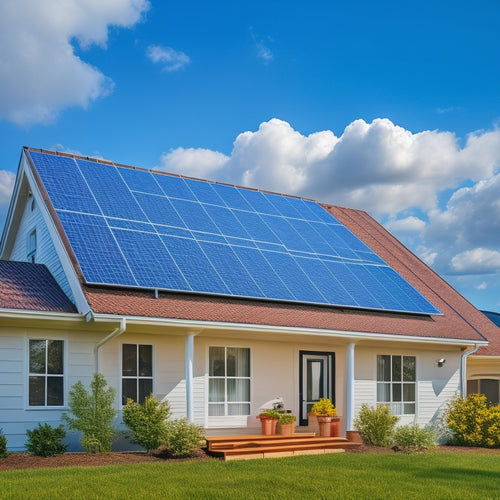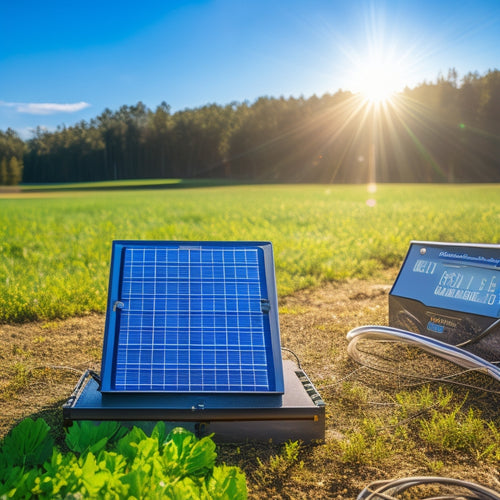
10 Essential Tips for RV Off-Grid Energy
Share
When designing an off-grid energy system for your RV, accurately evaluating your daily energy needs is vital, as it directly impacts the performance and reliability of your entire system. Choose high-efficiency solar panels that balance cost and energy output, and select deep cycle batteries that align with your off-grid energy needs. Invest in a quality charge controller, and monitor your energy usage closely to optimize system performance. Consider adding a wind turbine, store energy in a safe location, and keep your system well-maintained to guarantee continuous power supply. By following these essential tips, you'll be well on your way to achieving energy independence, and uncovering the full potential of off-grid exploration.
Overview
- Assess daily energy needs to design a suitable off-grid energy system, considering appliance usage and efficiency.
- Choose high-efficiency solar panels from reputable manufacturers, balancing cost and performance for optimal energy output.
- Select deep cycle batteries that align with off-grid energy needs, prioritizing compatibility, cycle life, and environmental impact.
- Implement energy conservation techniques, such as replacing incandescent bulbs with LEDs and upgrading to energy-efficient appliances.
- Regularly monitor energy usage to optimize system performance, identifying areas for power conservation and adjusting habits for continuous improvement.
Assess Your Energy Needs First
Determine your daily energy usage to confirm a suitable off-grid energy system for your RV. You need to understand your energy consumption patterns to design a system that meets your needs.
Start by tracking your lifestyle habits, including the number of hours you use lights, laptops, and appliances. Calculate your total daily energy consumption in watt-hours (Wh). Be honest about your habits - do you watch TV every night or spend hours on your computer?
Consider the energy efficiency of your appliances and devices, too. When selecting solar panels, remember to balance cost and efficiency to guarantee you get the right system for your needs.
Choose the Right Solar Panels
You'll want to select solar panels with high efficiency ratings to maximize your energy output, as even a small increase in efficiency can add up to significant gains over time.
When choosing the right panels, consider both wattage and size to guarantee you're meeting your energy needs without sacrificing precious roof space.
Additionally, evaluate warranty options, aiming for at least 25-year performance and 10-year material warranty reliable manufacturers, and research manufacturers for reliability and customer support.
Panel Efficiency Matters
Your RV's solar panel system is only as strong as its weakest link, and that often starts with the panels themselves.
When choosing solar panels, you'll want to prioritize efficiency to maximize energy conversion. Look for high-efficiency panels from reputable solar panel brands like SunPower, Panasonic, or LG.
These brands offer higher power output per square foot, resulting in more energy generated from the same amount of sunlight. A higher-efficiency panel can provide up to 20% more energy than a lower-efficiency one.
This means you'll need fewer panels to meet your energy needs, saving you space and weight on your RV's roof.
Considering the potential savings of up to 50% on electricity costs off-grid power solutions can provide, it's crucial to select the right panels for your needs.
Wattage and Size
Selecting the right solar panels for your RV's off-grid energy system requires a thorough understanding of wattage and size.
You'll need to calculate your energy needs to determine the required wattage. Consider your daily energy usage, including appliances, lights, and charging devices. Then, perform a wattage calculation to determine the total wattage needed.
When comparing solar panels, size matters. Larger panels produce more power, but may not fit on your RV's roof. Conduct a size comparison to find the ideal balance between power output and space constraints.
Select Deep Cycle Batteries Wisely
You'll want to select deep cycle batteries that meet your off-grid energy needs, and it all starts with choosing the right type, as different chemistries have unique characteristics.
You'll also need to take into account the battery's cycle life, as it directly impacts the overall cost of ownership and reliability of your system.
Battery Type Matters
With the heart of your off-grid energy system relying on batteries, the type you choose plays a critical role in overall performance and longevity.
You'll want to select a battery that balances cost with battery lifespan, maintenance, and performance. Consider battery compatibility with your system's components and guarantee safe installation and operation.
Look for batteries with advanced technology, such as monitoring systems, to optimize performance and identify potential issues. Additionally, consider the environmental impact and recyclability of your batteries.
Cycle Life Importance
Your deep cycle battery's cycle life is a critical factor in the overall performance and longevity of your off-grid energy system.
When selecting a deep cycle battery, you should prioritize cycle longevity to guarantee peak energy storage and minimize battery maintenance. A battery with a high cycle life can withstand more discharge cycles, which means it'll last longer and provide reliable power.
Look for efficiency ratings that align with your solar lifespan expectations to maximize off-grid sustainability. By choosing the right battery, you'll be able to utilize renewable resources efficiently and maintain your freedom on the open road.
Consider the total cost of ownership, including replacement and maintenance, to get the most value out of your investment.
Depth of Discharge
As the heart of your off-grid energy system, deep cycle batteries require careful consideration to guarantee peak performance and longevity.
You must select batteries that can handle the depth of discharge (DOD) you need. DOD refers to how much of the battery's capacity is used before recharging. A higher DOD means more energy is extracted, but it reduces the battery's lifespan.
You'll need to balance energy conservation with battery maintenance. A good rule of thumb is to keep your DOD between 20% and 50% to ascertain ideal performance and longevity. This will help you conserve energy while protecting your investment.
Invest in a Quality Charge Controller
Hook up your solar panels to a subpar charge controller and you'll be lucky to get a few months of reliable service. A quality charge controller is crucial for off-grid energy independence. It regulates the flow of energy from your solar panels to your batteries, preventing overcharging or undercharging. There are two main types of charge controllers: MPPT (Maximum Power Point Tracking) and PWM (Pulse Width Modulation).
| Charge Controller Type | Characteristics |
|---|---|
| MPPT | More efficient, especially in low-light conditions |
| PWM | Less expensive, but less efficient |
| Installation Tips | Description |
| Mount in a well-ventilated area | Prevents overheating |
| Connect batteries first, then solar panels | Guarantees safe and efficient energy flow |
Invest in a high-quality charge controller that suits your off-grid energy needs, and enjoy reliable power on the open road.
Monitor Your Energy Usage Closely
With your solar panels and charge controller in place, it's time to focus on optimizing your off-grid energy system's performance.
You need to monitor your energy usage closely to guarantee you're getting the most out of your setup. Energy monitoring allows you to track your usage patterns, identifying areas where you can make adjustments to conserve power.
This means you'll be able to stay off-grid for longer periods, enjoying the freedom that comes with it. By keeping a close eye on your energy usage, you'll be able to identify inefficiencies and make data-driven decisions to improve your system's overall performance.
This will help you maximize your energy independence and minimize your reliance on external power sources.
Optimize Your RV's Energy Efficiency
You've invested in a sturdy off-grid energy system, but it's equally important to optimize your RV's energy efficiency to get the most out of it. By implementing energy conservation techniques, you can greatly reduce your power consumption.
Start by replacing traditional incandescent bulbs with LED alternatives, which consume a fraction of the energy. Next, upgrade to efficient appliance choices, such as 12V refrigerators and propane-powered stoves.
Additionally, verify your RV is well-insulated to minimize heating and cooling demands. By taking these steps, you'll be able to boondock for longer periods while maintaining a comfortable living space.
With a well-optimized RV, you'll enjoy the freedom to venture without worrying about running out of power.
Consider Adding a Wind Turbine
Freedom from the grid takes on a new dimension when utilizing the power of wind.
You'll enjoy the wind turbine benefits, including reduced reliance on fossil fuels and lower energy costs.
When evaluating installation, you'll need to assess your location's wind patterns and identify a suitable spot for the turbine.
Installation factors include ensuring the turbine is mounted high enough to capture consistent wind flow, and that it's installed at a safe distance from your RV and any obstacles.
Additionally, you'll need to take into account the turbine's noise level and potential visual impact.
With proper planning and installation, a wind turbine can be an important addition to your off-grid energy system, providing you with a clean and sustainable source of power.
Store Energy in a Safe Location
Your energy storage system is the backbone of your off-grid setup, and its safe location is essential to preventing electrical shocks, fires, and even explosions.
When deciding on a location, consider secure placement in a well-ventilated area to prevent overheating. Guarantee fire safety by keeping the system away from flammable materials and heat sources.
Weather protection is also vital, so choose a location that shields the system from direct sunlight, rain, and extreme temperatures.
Accessibility considerations are important too, as you'll need to regularly inspect and maintain the system.
Finally, theft prevention is key, so consider locating the system in a secure, locked area to prevent unwanted access.
Keep Your System Well-Maintained
To guarantee your off-grid energy system runs efficiently, you'll need to perform regular maintenance tasks.
You should check your battery water levels regularly to prevent damage from low electrolyte levels, clean your solar panels to maintain their energy output, and monitor your system's performance to identify potential issues.
Check Battery Water Levels
One vital aspect of maintaining a healthy off-grid energy system is guaranteeing that your battery bank remains in top condition.
You'll want to check your battery water levels regularly to prevent damage from overheating or undercharging. Start by turning off the electrical system and locating the batteries. Identify the water level indicators and add distilled water as needed.
Be cautious not to overfill, as this can cause damage. Proper battery maintenance is essential, and regular water replacement is key. Neglecting this task can lead to reduced battery life and overall system performance.
Clean Solar Panels Regularly
By utilizing the power of the sun, your solar panels are a vital component of your off-grid energy system.
To guarantee peak performance, regular solar panel cleaning is essential. Dirt, dust, and debris can greatly reduce energy output, so it's important to maintain a cleaning schedule.
Set a reminder to clean your panels every 1-2 weeks, depending on your location and environmental conditions. Use a soft-bristled brush, mild soap, and distilled water to avoid scratching the panels.
A dirty solar panel can lose up to 25% of its efficiency, so stay on top of your maintenance schedule. By doing so, you'll maximize your energy production and enjoy the freedom that comes with off-grid living.
Monitor System Performance
Since your off-grid energy system is only as strong as its weakest component, monitoring system performance is essential to identifying potential issues before they escalate into major problems.
You'll want to utilize monitoring tools that provide real-time data logging and performance metrics. This will allow you to track usage patterns, energy forecasting, and efficiency tracking.
Set up system alerts to notify you of any anomalies or performance dips. By doing so, you'll be able to pinpoint areas for improvement and make data-driven decisions to optimize your system.
Regularly reviewing your system's performance will guarantee you're getting the most out of your off-grid energy setup, giving you the freedom to roam while staying connected.
Plan for Emergency Power Backup
To guarantee uninterrupted off-grid excursions, you must plan for emergency power backup. This critical aspect of emergency preparedness guarantees that your RV's essential systems remain operational during power outages or equipment failures.
Consider investing in backup solutions like portable generators, solar-powered generators, or battery banks with sufficient capacity to support your energy needs. Calculate your power requirements and choose a backup solution that can provide the necessary wattage.
Additionally, verify you have a plan for fuel storage and maintenance to keep your backup system running smoothly. By prioritizing emergency power backup, you'll enjoy the freedom to investigate off-grid destinations without worrying about power outages disrupting your journey.
Frequently Asked Questions
Can I Use Regular Car Batteries for Off-Grid Energy Storage?
You can't simply use regular car batteries for off-grid energy storage; they're designed for high-current, short-duration starts, not deep-cycle, long-duration energy storage. Instead, consider specialized deep-cycle batteries or alternative energy storage options for your off-grid needs.
Will My Solar Panels Still Work on Cloudy Days?
You'll be relieved to know that your solar panels will still generate power on cloudy days, albeit with reduced efficiency, typically 10-20% of ideal output, due to lower irradiance levels, making it essential to take into account cloudy weather performance when sizing your system.
Can I Power My Rv's Air Conditioner With Off-Grid Energy?
You'll be amazed that 90% of RVers opt for off-grid living! To power your RV's air conditioner, you'll need a strong solar inverter capable of handling high surge currents; consider energy efficiency tips like upgrading to an inverter-driven AC unit for best performance.
How Often Should I Replace My Deep Cycle Batteries?
You'll want to replace your deep cycle batteries every 5-7 years, depending on usage and maintenance; proper care, like regular charging and cleaning, can extend battery lifespan, but even with good maintenance tips, they'll eventually need replacement.
Can I Install an Off-Grid Energy System Myself?
You're a thousand times more capable than you think, but installing an off-grid energy system yourself requires serious DIY chops; carefully research and vet off-grid components to guarantee a seamless, reliable setup that gives you the freedom you crave.
Ready to Buy
As you venture off the grid, remember that your energy system is like a well-tuned orchestra - each component plays a crucial role in harmony. Neglect one instrument, and the entire performance falls flat. By following these 10 essential tips, you'll be composing a masterpiece of off-grid energy independence. Take it from the RVer who learned the hard way: a single malfunctioning component can leave you stuck in the dark - literally. Stay in tune, and the melody of freedom will be yours to enjoy.
Related Posts
-

Top Portable Refrigerators for Camping Adventures
When you're camping, having a reliable portable refrigerator can make all the difference for keeping your food fresh ...
-

Cost of Solar Panel Installation
You can expect to pay between $15,000 and $30,000 or more for a typical solar panel installation, depending on the sy...
-

Choosing the Right Solar Power Charge Controller
Choosing the right solar power charge controller is crucial for maximizing energy efficiency and extending battery li...


